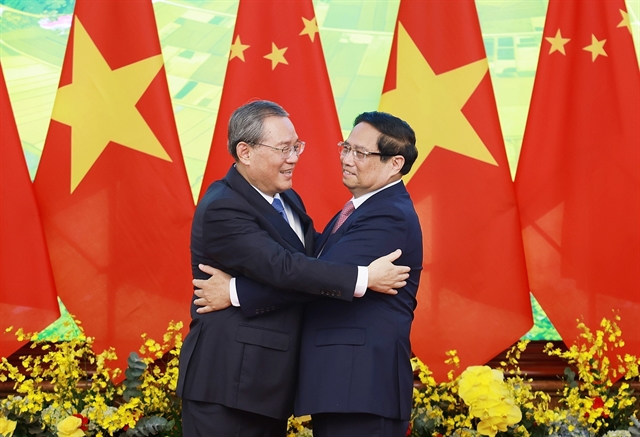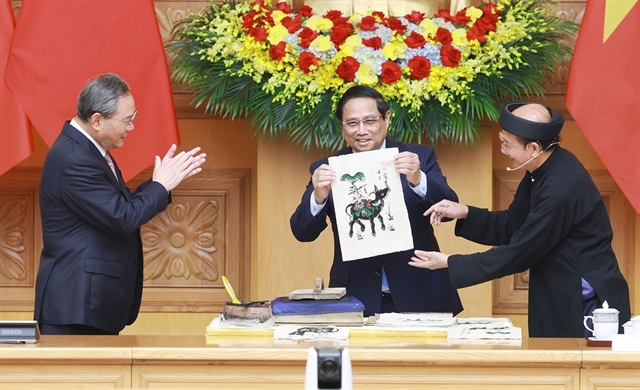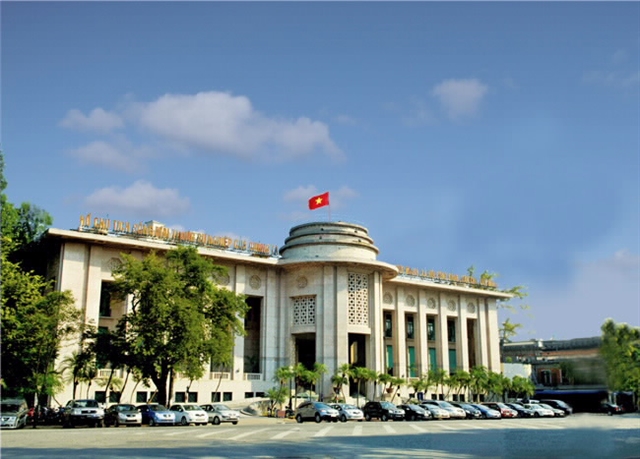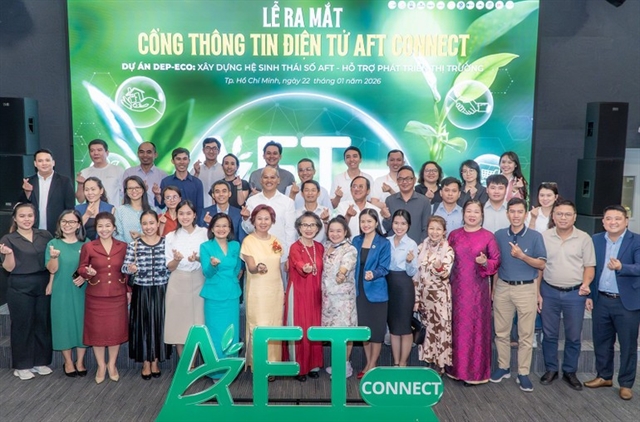 Politics & Law
Politics & Law

 |
| Prime Minister Phạm Minh Chính and Chinese Premier Li Qiang attended the Việt Nam-China business workshop in Ha Nội on Sunday, where they urged businesses of both nations to strengthen economic ties and drive sustainable development. VNA/VNS Photos |
HÀ NỘI – Việt Nam and China issued a joint statement on the occasion of Chinese Premier Li Qiang's official visit to the neighbouring country on October 12-14 at the invitation of Prime Minister Phạm Minh Chính.
According to the joint statement, during his stay in Việt Nam, Premier Li met with Party General Secretary and State President Tô Lâm and Chairman of the National Assembly Trần Thanh Mẫn, and held talks with PM Chính.
In an atmosphere of sincerity and friendship, the two sides held in-depth discussions and reached broad common perceptions on promoting the comprehensive strategic cooperative partnership and the building of the Việt Nam-China community with a shared future that carries strategic significance. They also exchanged views on regional and international issues of shared concern.
Reviewing the development of the relations between the two Parties and countries, the leaders said during the past struggles for national independence and liberation, they supported each other, forming the close Việt Nam-China relationship featuring “camaraderie plus brotherhood”.
During the period of reform, they have stepped up exchanges, experience sharing, and mutually beneficial cooperation, for the sake of their people, the leaders continued.
Both sides stressed the need to carry forward the traditional friendship, continue deepening and strengthening the comprehensive strategic cooperative partnership, and work together to build the Việt Nam-China community with a shared future of strategic significance, while pushing the relations between the two Parties and countries to a new height.
Host leaders shared the belief that under the leadership of the Communist Party of China Central Committee led by Party General Secretary and President Xi Jinping, China will successfully transform itself into a great modern socialist country and achieve its second centenary goal.
The Chinese side also congratulated Việt Nam on its achievements over the past time, and noted the belief that under the sound leadership of the Communist Party of Việt Nam Central Committee headed by General Secretary and President Tô Lâm, the Vietnamese people will successfully implement goals and tasks set at the 13th National Party Congress, and organise the 14th congress in 2026, reaching the status of a socialist-oriented developed country with high income by 2045.
 |
| PM Chính and Chinese Premier Li Qiang got hands-on experience of making Đông Hồ folk paintings and visited an exhibition displaying Việt Nam’s distinctive agricultural products exported to China . |
China affirmed its support for Việt Nam's efforts towards prosperous development, the well-being of its people, a strong, independent, and self-reliant economy, comprehensive promotion of reform, industrialisation, modernisation, international integration, the expansion of its foreign relations, and its enhanced role for peace, stability, development, and prosperity in the region and the world.
China said it consistently views Việt Nam as a priority in its neighborhood diplomacy. In return, Việt Nam stated that its relations with China remain a top priority in its foreign policy of independence, self-reliance, diversification and multilateralism.
Both sides considered this a strategic choice and held that each country's development presents opportunities for the other and serves as a positive factor contributing to regional and global progress.
They agreed to fully implement the key common perceptions reached by the top leaders of the two Parties and countries, as well as previous joint statements.
They reaffirmed their commitment to the motto of “friendly neighbourliness, comprehensive cooperation, long-term stability, and looking towards the future,” the spirit of being “good neighbours, good friends, good comrades, and good partners,” and “six major goals”, comprising stronger political trust, more substantial cooperation in defence – security, deeper and more practical cooperation, more solid social foundation, closer multilateral coordination, and better management and settlement of differences. These efforts are intended to accelerate the building of the Việt Nam-China community with a shared future of strategic significance, bringing tangible benefits to both peoples and contributing to peace, cooperation, and development in the region and the world at large.
The two sides agreed to maintain high-level strategic discussions, particularly between the top leaders of the two Parties and countries, to guide the development of the Việt Nam - China relations.
The two Governments will enhance directing ministries, sectors, and localities to realise the high-level common perceptions and promote important cooperation in different fields more fruitfully. The special role of the Party-to-Party relations will be fully brought into play. The two sides will actively and effectively implement the cooperation agreement signed in April 2024 between the National Assembly of Việt Nam and the National People’s Congress of China. Meanwhile, friendship exchanges and cooperation between the Việt Nam Fatherland Front and the Chinese People’s Political Consultative Conference will be boosted.
They also agreed to promote the general coordinating role of the Steering Committee for Việt Nam - China Bilateral Cooperation in ordering ministries, sectors, and localities to step up the building of the Việt Nam - China community with a shared future. Mechanisms and forms of discussion and cooperation in such strategic areas as diplomacy, national defence, and security will be fostered.
The Vietnamese side affirmed its consistency in the “One China” policy, and its recognition that there is only one China in the world, Taiwan is an integral part of the Chinese territory, and the Government of the People’s Republic of China is the sole legal government representing the whole of China. It also held that the issues of Hong Kong, Xingang, and Tibet are internal affairs of China, expressing its belief that under the leadership of the Chinese Party and Government, those regions will stay stable and prosper.
The Chinese side spoke highly of these viewpoints of Việt Nam and voiced support for the latter’s sustained social stability, national security, development, and national solidarity.
The two sides agreed to augment defence-security cooperation, one of the important pillars of the bilateral relations. They concurred to further increase all-level exchanges between the two countries’ armies, continue to deepen collaboration in border defence and well deploy joint patrols in the Gulf of Tonkin and mutual visits by military vessels, and intensify the exchange and cooperation mechanisms between the countries’ navies and coast guards.
Việt Nam and China were unanimous in properly bringing into play such mechanisms as the ministerial-level meeting on anti-crime cooperation, the strategic security dialogue at the deputy minister level, and the dialogue on political security at the deputy minister level, while effectively carrying out cooperation in the fields of security, intelligence, counter-terrorism, and cross-border crime combat.
In addition, they agreed to promote the connection of the two countries’ development strategies, properly implement the cooperation plan on connecting the “Two Corridors, One Belt” framework with the “Belt and Road” initiative, and accelerate the countries’ connectivity in the fields of railway, expressway, and border gate infrastructure.
The two sides will encourage and support capable and reputable enterprises with advanced technology to invest in each other’s country, with a focus on high-tech agriculture, infrastructure, clean energy, digital economy, and green development. They are set to create a fair and favourable business environment for each other’s enterprises. They will also share experience in state-owned enterprise reform and management, carry out cooperation in human resources training, and actively consider stronger collaboration in the field of critical minerals.
The two sides agreed to promote the role of the Regional Comprehensive Economic Partnership (RCEP) and the ASEAN-China Free Trade Area (ACFTA); make good use of e-commerce platforms and exhibitions; strengthen customs cooperation, and expand the export of key goods of one country to the other.
They will also enhance the role of their joint working group on e-commerce cooperation and boost e-commerce cooperation between their enterprises. China welcomes Việt Nam to organise trade promotion activities in China.
The two sides will promote the early signing of the Protocol on exports from Việt Nam to China such as chili, passion fruit, raw bird's nest, processed bird's nest. China is ready to continue to create favourable conditions to open its markets for Vietnamese agricultural products such as citrus fruits, avocado, custard-apple, rose apple, medicinal herbs, buffalo meat, beef, pork, and products from livestock and poultry. China is also willing to facilitate Việt Nam's establishment of more trade promotion offices in Haikou, Hainan province and some related localities.
Meanwhile, Việt Nam supports China's accession to the Comprehensive and Progressive Agreement for Trans-Pacific Partnership (CPTPP) in accordance with the standards and procedures of the agreement; actively welcomes the application of China’s Hong Kong Special Administrative Region to join the RCEP.
The two sides agreed to strengthen agricultural cooperation, promote cooperation in cultivation and agricultural processing. They will also strengthen cooperation in meteorology and natural disaster prevention and mitigation, exchange of hydrological data during flood season, integrated water resources management, flood/drought prevention, and irrigation science and technology, among others.
They affirmed that they will preserve the traditional friendship, keep in mind the common ideals and missions, and persistently promote the Việt Nam-China friendship. They will effectively coordinate in organising activities within the framework of the "Year of Việt Nam-China Humanistic Exchange 2025”, as well as those to mark the 75th anniversary of the bilateral diplomatic relations, thus enhancing mutual understanding and friendship between the people of the two countries, especially the young generation.
The two sides agreed to effectively implement scholarship programmes for Vietnamese students, and encourage student exchanges, while enhancing collaboration in vocational education and exchanges between their universities and research institutes, and promoting the role of the Chinese Cultural Centre in Việt Nam.
They also affirmed to strengthen multilateral cooperation in line with the process of building the Việt Nam-China community with a shared future of strategic significance; persistently uphold multilateralism, the "Five Principles of Peaceful Coexistence”, and basic norms of international relations.
They agreed to advance cooperation within major initiatives, including the Global Development Initiative, the Global Security Initiative, and the Global Civilisation Initiative.
They were committed to promoting exchanges and collaboration in human rights based on equality and mutual respect, advocating for enhanced dialogues and international cooperation in this field, while firmly opposing the "politicisation," "instrumentalisation", and double standards in human rights issues, as well as human rights abuse for interfering in the internal affairs of other countries.
The two sides also consented to strengthen coordination within multilateral mechanisms such as the United Nations and the Asia-Pacific Economic Cooperation (APEC) forum and support each other's candidacies at international organisations. China expressed its support for Việt Nam's bid to host APEC Year in 2027, and welcomed the country to join in and promote its role at multilateral mechanisms.
China said it backs ASEAN’s efforts in building a cohesive, united, resilient, and developed community, and in maintaining its centrality in the evolving regional architecture. China will work together with ASEAN nations to promote the initiative on the establishment of the "Five Common Homes" featuring peace, security, prosperity, beauty, and friendship. The two sides also appreciated the substantive progress in the negotiations for the version 3.0 of the ASEAN-China Free Trade Area.
The sides agreed to enhance cooperation within the Mekong-Lancang cooperation framework, make efforts to build a community with a shared future among Mekong-Lancang countries, for peace and prosperity. They also aimed to strengthen cooperation within the Greater Mekong Subregion (GMS) framework.
They shared the view that relations between countries must adhere to the United Nations Charter, international law, and the basic norms governing international relations, emphasising mutual respect, equality, mutual benefit, win-win cooperation, and respect for each other’s sovereignty and territorial integrity. They said disagreements should be persistently resolved through peaceful means.
For maritime issues, the leaders stressed the need to better control and settle disagreements, and maintain peace and stability in the East Sea and the region. They agreed to abide by the common perceptions reached by the high-ranking leaders of the two Parties and countries, and to seek acceptable, long-term solutions in line with the Việt Nam-China Agreement on basic principles guiding the settlement of sea-related issues and international law, including the 1982 United Nations Convention on the Law of the Sea (UNCLOS).
They committed to avoiding actions that could complicate the situation or escalate disputes, to maintaining stability at sea, and to advancing discussions on joint development at sea and the delimitation of the waters beyond the mouth of the Gulf of Tonkin. Both sides agreed to enhance cooperation in less sensitive sea-related areas, and search and rescue operations at sea.
The two sides will continue to fully and effectively implement the Declaration on the Conduct of Parties in the East Sea and work towards an early conclusion of a substantive and effective Code of Conduct (COC) in the East Sea in line with international law, including the 1982 UNCLOS.
They concurred to maximise the Việt Nam-China Land Border Joint Committee and Cooperation Committee on Việt Nam-China Land Border Gate Management, ensure the effective implementation of the three legal documents on the land border between the two countries and related agreements.
During the Chinese leader's visit, the two sides signed numerous cooperation agreements in areas such as transport connectivity, customs, social welfare, education, agricultural trade, media, and banking.
The two sides expressed their satisfaction with the results of Premier Li's visit to Việt Nam, saying it has played a role in advancing the building of the Việt Nam-China community with a shared future of strategic significance. VNS




